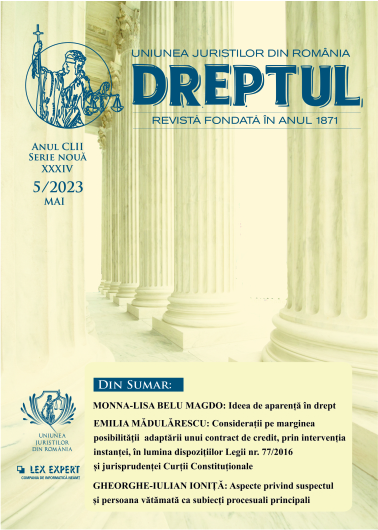Mecanismul juridic al gestiunii de afaceri potrivit reglementărilor Codului civil
The legal mechanism of the business management according to the regulations of the Civil Code
Author(s): Lacrima Rodica BoilăSubject(s): Civil Law
Published by: Uniunea Juriștilor din România
Keywords: legal facts; business management; legal acts and material management acts;
Summary/Abstract: The issue of the classification of civil obligations according to sources has triggered controversies over time, in doctrinal, but also jurisprudential terms, due to the need to establish the specific conditions of each category of obligation relationships. The current Civil Code has abandoned the classical classification of the sources of obligations into contracts, quasi-contracts, delicts and quasi-delicts, aligning with the orientation of modern civil codes, stating that the sources of obligations are legal acts and facts, which in their turn, legal facts can be legal or illegal. From the category of lawful legal facts – sources of civil obligations, business management is characterized by the intervention of the manager in the affairs of another person, called „gerat”, consisting in the conclusion of legal acts with third parties or the execution of material acts, voluntarily, disinterestedly and without having received an assignment or a mandate in this regard. The legal mechanism is triggered by the creation of the obligation to compensate the manager for the expenses incurred by him in the management of the affairs and interests of the „gerat”. The logical-legal reasoning behind the birth of this binding relationship is the idea of equity for covering the losses or expenses incurred by the manager for an altruistic purpose, to help. The study proposes an analysis of the institution of business management, according to the current regulation, in order to emphasize the new aspects, such as the essential condition regarding the opportunity of the manager’s intervention, the effects of the management towards third parties or the hypothesis in which the manager acts knowing that the client cannot protect his own interests not having the possibility to appoint a representative. In the introductory part of the paper, we presented considerations regarding legal acts, in general, business management, in particular, with a short historical foray (I). We continued with the exposition of the regulation of business management, from ancient times, from Roman law, to the current Civil Code (II) and its definition in doctrine (III). We analyzed the legal nature of business management to argue that this mechanism is specific to a lawful legal fact, the effects are produced under the law, not being a unilateral (unnamed) legal act (IV). We presented the conditions of business management structured in two categories: objective with reference to the object of business management and the characteristics of legal acts and material acts of management, and subjective, by reference to the attitude and behaviour of people who become or may be bound by the effects or the effect of this mechanism (V).In the final part, we analyzed the effects of business management, primarily between the manager and the managed, in the content of which there are mutual and bilateral obligations, as regulated by the provisions of Articles 1.331–1.335 and Article 1.337 of the Civil Code, and then when the guarantor acts in the interest of the guarantor and has concluded legal acts with third parties, the effects of which also apply to these persons (VI).
Journal: Revista „Dreptul”
- Issue Year: 2023
- Issue No: 05
- Page Range: 47-67
- Page Count: 21
- Language: Romanian
- Content File-PDF

